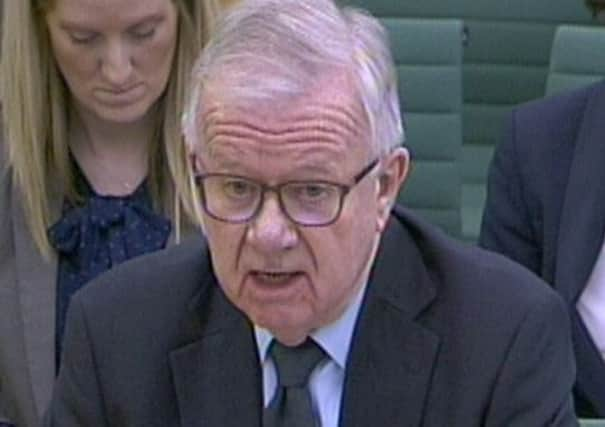No regrets as Chilcot defends five year wait for Iraq War answers


Sir John Chilcot has said he wanted deliver a report on the war “as soon as we possibly can” but renewed his assertion that he saw “no realistic prospect” of it being finished before May’s General Election.
Speaking before the Commons Foreign Affairs Committee, he rejected calls for immediate publication.
Advertisement
Hide AdAdvertisement
Hide AdSir John said: “My committee and I want, and intend, to deliver our report to the Prime Minister as soon as we possibly can,” he said.
“But as I said to the Prime Minister ... I see no realistic prospect of doing so before the general election.
“We have to maintain the principles by which we have operated throughout: fairness, thoroughness and impartiality.
“It is our duty to deliver a report which gives the Government, Parliament, the public, and particularly all those who have been deeply affected by events in Iraq, the answers they deserve.”
Advertisement
Hide AdAdvertisement
Hide AdHe added that he recognised the “exceptionally high level of parliamentary and public interest in our progress”.
Much of Sir John’s evidence concerned the ongoing process of contacting individuals criticised in the draft document so they have an opportunity to respond - a procedure known as Maxwellisation.
The start of the process was seriously held up as it had to await agreement - now secured - with the Cabinet Office over the right to publish sensitive documents alongside the report.
That included “success in overturning long-standing conventions” on the secrecy of such material, he said.
Advertisement
Hide AdAdvertisement
Hide AdHe said he had “no evidence” thaIn a caution to key players, Sir John said: “As of today, I have no reason to think that anyone in the Maxwellisation process is seeking to spin out time - but I also say that we are not going to give people an indefinite amount of time, only the amount of time that we regard as reasonable for them, case by case, in their circumstances.”
Tony Blair, who as prime minister in 2003 took the UK into the US-led war, has insisted he is “absolutely and emphatically” not responsible for delaying the report.
Sir John said the fraught negotiations with Cabinet Secretary Sir Jeremy Heywood were conducted “in good faith”.
“I don’t think I could accuse Government departments of unreasonableness,” he told the committee.
Advertisement
Hide AdAdvertisement
Hide Ad“But substantial amounts of time were taken up at critical points.”
Remaining issues of declassification are “not now a factor that affects the progress of the report to conclusion”, he added.
He defended the way the hearings had been conducted without the use of legal counsel, unlike the Leveson Inquiry.
He said: “The process we chose was essentially investigative and therefore inquisitorial, rather than adversarial.
Advertisement
Hide AdAdvertisement
Hide Ad“If we had gone down the road of appointing counsel to do our questioning we would have had to concede legal representation to witnesses. You get then into a quite different kind of process.”
He added: “I think the moment you set up an adversarial, two-sided process, you are liable to get much less in the way of voluntarily-offered evidence and insights.
“I believe that because we held our public hearings very early, before we had formed any - even provisional - criticisms, we actually got more out of our witnesses.”
He added that Commons select committees were designed to “draw out as much as possible” from witnesses without them being “defensive and guarded by a legal representative”.
Advertisement
Hide AdAdvertisement
Hide AdSir John said he was satisfied he had the evidence needed for his report.
Prime Minister David Cameron has been among those expressing frustration that the report has yet to be finalised, more than five years after the inquiry, which took evidence from its last witness in 2011, was launched.
Last week MPs debated the delays in Parliament - with some demanding that the existing text and key evidence be handed over immediately for publication.